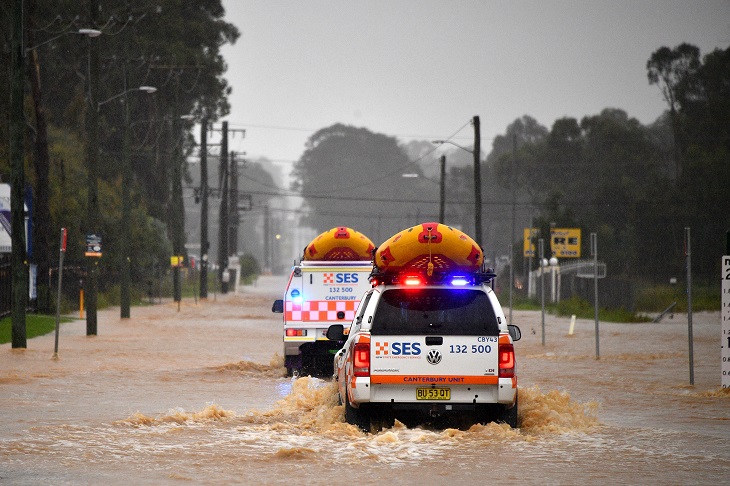Expectations of the role of the federal government rose substantially during the bushfires which spread across the eastern states in late 2019 and early 2020. They are rising again in response to the floods in New South Wales and Queensland.
Those fires were not the worst on record, if judged by the number of lives lost rather than hectares burnt or homes destroyed. Nonetheless, they were characterised as ‘unprecedented’, prompting a chorus of demands for the Prime Minister to get involved. When it was discovered he had gone to Hawaii for a holiday with his family, he was then accused of being negligent for leaving the country at a time of unprecedented disaster.
The Prime Minister did not leave the country when New South Wales and Queensland were hit by floods, but it is unlikely the opprobrium he attracted would have been worse if he did. As with the bushfires, the narrative was that they were unprecedented – again not accurate – and that the government should have acted sooner and done more. Once again, Morrison was characterised as negligent for having failed to ensure this occurred.
Perhaps it is not surprising that so many people think of Morrison when they think of ‘the government’, given that federal politics tends to occupy the news. The public’s understanding of our system of government is pretty dismal, including awareness of the constitutional limits on the federal government. Much of the media is pretty ignorant too, although hostility to Morrison is probably a bigger factor.
But what these narratives reveal is that the expectations now placed on governments of any persuasion are higher than they have ever been. Whether it is floods, fires, droughts, earthquakes, or cyclones, there is a popular and growing view that the government should not only be there to pick up the pieces the moment a calamity occurs, but that it should have anticipated the calamity and done everything possible to head it off.
By any standard, this is both ridiculous and contradictory. Most people acknowledge that governments are inefficient, bureaucratic, and slow, yet somehow believe that next time they won’t be.
Australia’s problem is too much government, not enough. From petty, intrusive local government to authoritarian state governments and over-taxing, over-spending, ‘more money will fix it’ federal government, there is just too much of it. And this is occurring at the cost of volunteers.
There was a time, not that long ago, when Australia was immensely proud to be a volunteer society. Thousands of kids were inspired to join the surf lifesavers, setting an example for the rest of the world. Volunteer fire brigades saved whole communities. Dozens of charities, not just the Salvation Army and Red Cross, all volunteers, provided help and hope to those in need.
Indeed, prior to the emergence of the welfare state in the second half of the twentieth century, volunteer charities were involved in health care, childcare, education, and unemployment support. In the nineteenth century you would have been considered weird if you had predicted that most of these would end up being run by governments. These days you’d be called weird for suggesting volunteers might do them better.
Volunteers are always the first responders in fire and flood emergencies, as families, neighbours, and friends rally around. Next is often the State Emergency Service and Rural Fire Service in NSW, and their equivalents in the other states. Both are still volunteer-based, although they are increasingly coming under the control of full-time public servants and subject to the inefficiencies of government bureaucracy. In Victoria, the sad decline of the CFA is an illustration of that.
The latest example is the policy requiring volunteers to be fully vaccinated against Covid. Unvaccinated volunteers have been turned away and are no longer permitted to fight fires or rescue flood victims.
As Covid vaccines merely reduce the potential for serious illness rather than prevent infection or transmission, this is quite unscientific and irrational. More to the point, it seriously undermines the capacity of those organisations to help people. I am advised that among RFS volunteers on the Central Coast, barely 50 per cent are vaccinated. I don’t have comparable numbers for the SES, but I understand many SES volunteers have left and in northern NSW entire SES stations have closed. Perhaps that explains why there were complaints about slow response times during the floods in NSW.
It might also explain the increasing calls for the federal government to bring in the Australian Defence Force. Obviously ADF members are not volunteers, but they are also not intended to be used as emergency workers. Indeed, using the ADF for anything other than the defence of the country, including enforcement of Covid lockdowns or responding to emergencies, undermines its purpose and reduces its capabilities.
The Prime Minister has half-heartedly made that point, but seems reluctant to argue for the importance of volunteers. The NSW Premier has simply apologised for the slow response of the government to the crisis.
It would not be surprising if the forthcoming Budget included a proposal to create a federal emergency response agency.
When more than half the population is dependent on the government, volunteers are always at risk of being seen as inferior. Volunteerism serves as a reminder that governments cannot do everything. It deserves more support.
David Leyonhjelm is a former senator for the Liberal Democrats.
Got something to add? Join the discussion and comment below.
Get 10 issues for just $10
Subscribe to The Spectator Australia today for the next 10 magazine issues, plus full online access, for just $10.

























Comments
Don't miss out
Join the conversation with other Spectator Australia readers. Subscribe to leave a comment.
SUBSCRIBEAlready a subscriber? Log in